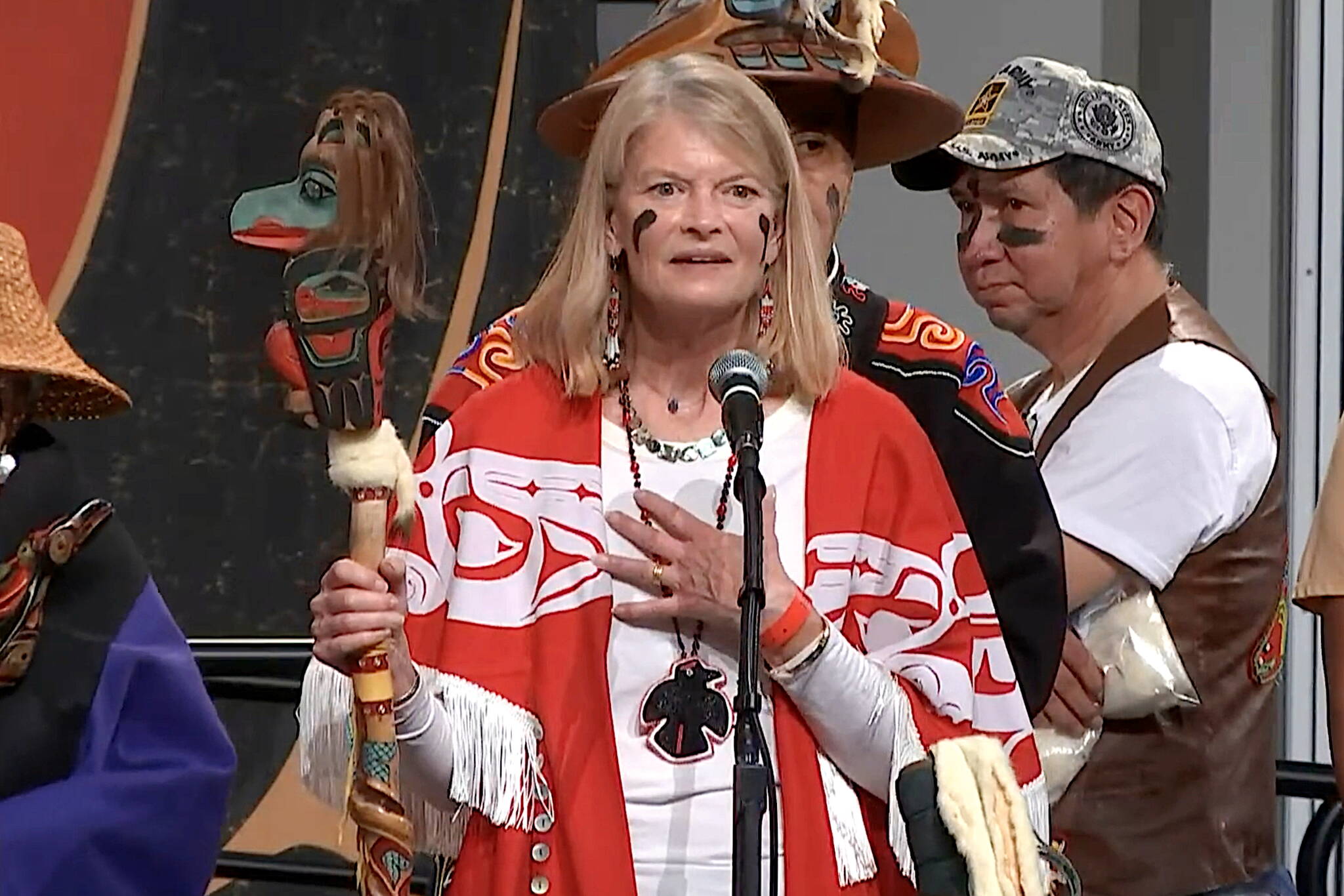An apology for the bombardment that destroyed Angoon in 1882 will be offered by the U.S. Navy, U.S. Sen. Lisa Murkowski said while appearing with a dance group from the Tlingit village at Celebration on Friday.
The attack when the Navy opened fire on and burned the village, leaving few structures intact, and resulting in the death of at least six children and “countless” more due to its impact during the winter, according to the Sealaska Heritage Institute. Historical narratives by Natives in Angoon and the Navy differ, but both agree the attack resulted from the death of a Native on a whaling ship that resulted in the whaling company reaching out to the Navy to intervene.
Murkowski, who in 2011 was adopted into the Deisheetaan clan of the Tlingit tribe with the name Aan shaawátk’i (“Lady of the Land”), made the announcement about the apology while appearing with the Xudzidaa Ḵwáan Dancers on Friday evening at Centennial Hall. Invoking the “Together We Live in Balance” theme of this year’s Celebration, she said “sometimes when trying to find that balance apologies need to be made, to say ‘I am sorry we failed you,’ and sometimes it is your government that needs to say those words of apology.”
“I share with you today the news that the Navy, our military, our country will be offering that apology to the people of Angoon for your loss, so that the stories that have been told of the anguish and the trauma for so many years, that you may begin to finally heal when those words of apology and respect are finally afforded to you,” she said. “So together we celebrate, we honor and we live for our children’s children.”
Details of how, when and what form an apology from the Navy to Angoon will take were not immediately available Saturday from Murkowski’s office in Washington, D.C.
The bombardment “followed a pattern the American military had established not long after the U.S. took possession of Alaska from Russia in 1867,” according to a SitNews article published on the 125th anniversary of the attack. Fatal conflicts between the military and Tlingits in 1869 resulted in the bombardment of Wrangell and destruction of unoccupied villages near Kake.
However, public reaction to the Angoon bombardment was a factor in the passage of the First Organic Act of 1884, where the Department of Alaska was organized into the District of Alaska, putting it under civilian rather than military control.
The death aboard the whaling vessel occurred when bombs used for whaling accidentally exploded and killed an Alaska Native crew member from Angoon, according to historical accounts.
In response, the village of Angoon demanded 200 blankets from the private company as payment for the death, along with “seizing the whaling-boats with their equipment, and holding two of the white men prisoners until the amount should be paid,” explained a letter from the Navy ship Corwin’s commander, M.A. Healy.
But instead the private company reached out to the Navy, which dispatched ships with marines to Angoon. According to the letters, the hostages were immediately released when the ships arrived but as “punishment” the U.S. Navy Captain E.C. Merriman “demanded twice the number of blankets demanded by the Indians, and threatened, in case of refusal, to destroy their canoes and villages.”
However, the village was unable to meet the demands, resulting in the attack that destroyed all but five houses, and all but one of the village’s approximately 40 canoes.
Angoon residents celebrated the arrival of its first traditional dugout canoe last year to mark the 140th anniversary of the bombardment. Chenara Kookesh-Johnson, a Tlingit language teacher for Chatham School District and Goldbelt Heritage Foundation, said during the celebration a long-requested apology from the Navy would allow a full healing for residents and future generations.
“We are still here, we are still thriving given the traumatic events that we’ve been through — want them to know that they do belong here, and this is their home and we’re going to do this even after an apology comes,” she said. “We can’t keep mourning, we can’t keep being sad, we have to take what life gives us and make the best of it — and I think that’s what we’re doing today.”
• Contact Mark Sabbatini at mark.sabbatini@juneauempire.com or (907) 957-2306.

